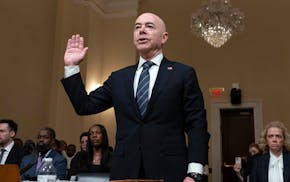A frustrated Gov. Mark Dayton accused Minnesota's charitable gaming interests Thursday of not being "on the same planet" with state officials who want to use electronic bingo and pulltab money to help pay for a new Minnesota Vikings stadium.
Dayton began another day of stadium politics by saying he was "mystified" as to why the charitable gaming industry was thwarting a plan to allow electronic bingo and pulltabs in Minnesota bars and restaurants. Stadium proponents hope to use part of the proceeds from those machines to fund the state's $398 million share of the nearly $1 billion project.
For weeks, however, the charities have said that the state plan did not provide them enough tax relief to make the games financially feasible.
"I don't see the charities and the commissioner of revenue, Myron Frans, on the same planet in terms of their analysis," the DFL governor told reporters.
The governor was quickly joined in his complaints by the president of Home Field Advantage, an influential Minneapolis business group that backs the stadium. Sam Grabarski said legislators were "doing more arguing" than usual in challenging state estimates that the new gambling money would generate enough revenue for the state's share of the project.
"This year, there's been more arguing among political leaders" over the accuracy of state revenue projections "than several of us have seen in decades," said Grabarski. He said legislators were seeking "unusually high standards" in making sure the gambling revenue would be enough to prevent state general funds from being used for the stadium.
As another day slipped away with no stadium hearing, Dayton and Grabarski highlighted the two key roadblocks to moving the Vikings stadium plan forward.
But they weren't the only problems. The stadium controversy also hung over some legislators who face critical political endorsing conventions this weekend.
"I actually expect it will come up," said Sen. John Harrington, DFL-St. Paul, who faces an endorsing convention. "I'm not shying away from the idea" that a new Vikings stadium would mean jobs for some of his unemployed constituents, he said.
Sen. Jeff Hayden, DFL-Minneapolis, another legislator facing an endorsing convention this weekend, said voters in his district were "loud and very vocal that they don't want public subsidy [for a stadium] and they don't like this deal." He said that "I don't see any way that I could" support the project.
In one of the more intriguing endorsing contests, House Majority Leader Matt Dean and Rep. Carol McFarlane, R-White Bear Lake, are facing each other because of redistricting.
McFarlane said that the stadium had not been a top issue in her district, but added that even though she understood the economic benefits of keeping the team in Minnesota, "I haven't seen a [financing] package that I've been able to support."
With the Legislature nearing adjournment, supporters continued to push the project that would build a new stadium in downtown Minneapolis and have the Vikings contribute $427 million. In addition to the state's share, the city would add $150 million for construction, and pledge another $189 million for operating costs.
Grabarski's group released a study Thursday claiming that the annual economic loss from not having a new stadium could surpass $500 million, counting lost parking revenue, taxes, conventions and spending at hotels, bars and restaurants.
Rep. Joe Hoppe, R-Chaska, who chairs the House Commerce and Regulatory Reform Committee, said his panel could have the first House stadium hearing on Monday, but acknowledged that he had more than once promised that a hearing was imminent.
For most of the past month, the impasse over the charitable gaming money has been at center stage.
King Wilson, longtime executive director of Allied Charities of Minnesota, an umbrella group for charitable organizations, said Thursday that state officials did not seem to understand that many of his groups might not install electronic bingo and pulltab machines because the required prize payback made it fiscally impractical.
"We cannot hit the [prize payback] under the current tax system," he said Thursday.
Dayton said that the charities were already getting $42 million annually from charitable gaming, and that the electronic bingo and pulltab plan could give them $62 million more a year.
"They characterize that as a loss," the governor said Thursday. "I'm just mystified."
But Wilson has a critical ally in House Speaker Kurt Zellers, whom Wilson said was the keynote speaker at the group's convention in November and co-sponsored legislation pushed by the charities last year. Zellers has frustrated Vikings stadium proponents by declining to take a lead role in pushing the project.
"Am I appreciative that Speaker Zellers is in our corner? Absolutely," said Wilson.
Mike Kaszuba • 651-222-1673
Democrats clear path to bring proposed repeal of Arizona's near-total abortion ban to a vote
Biden is off on details of his uncle's WWII death as he calls Trump unfit to lead the military
North Carolina university committee swiftly passes policy change that could cut diversity staff
Trump lawyers say Stormy Daniels refused subpoena outside a Brooklyn bar, papers left 'at her feet'
